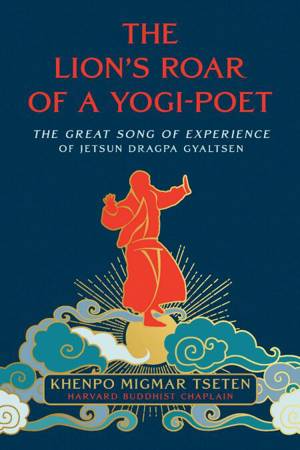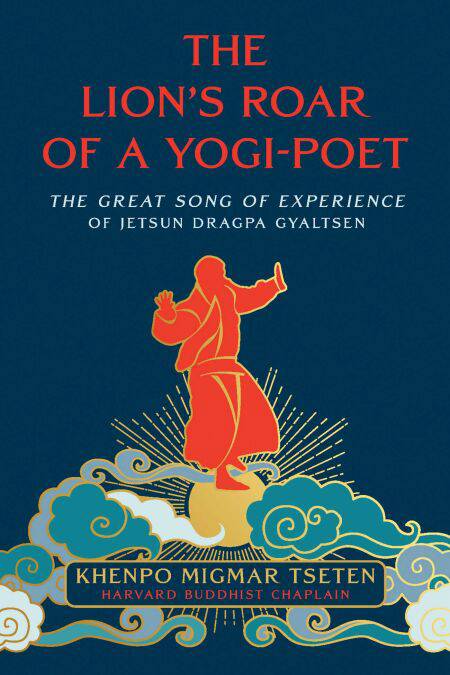
- Retrait gratuit dans votre magasin Club
- 7.000.000 titres dans notre catalogue
- Payer en toute sécurité
- Toujours un magasin près de chez vous
- Retrait gratuit dans votre magasin Club
- 7.000.0000 titres dans notre catalogue
- Payer en toute sécurité
- Toujours un magasin près de chez vous
The Lion's Roar of a Yogi-Poet EBOOK
The Great Song of Jetsun Dragpa Gyaltsen
Lama Migmar Tseten
Ebook | Anglais
20,12 €
+ 20 points
Description
An exultant song of realization by one of Tibet’s greatest yogis, explained and elaborated upon by a beloved contemporary Tibetan teacher.
Jetsun Rinpoche Dragpa Gyaltsen (1147–1216)—revered as one of Tibet’s greatest yogis and one of the founding figures of the Sakya school of Tibetan Buddhism—composed his Great Song of Experience as a way to distill and communicate the essence of the Buddhist path to enlightenment. Shimmering with double meanings, seeming tautologies, and ribald references, Dragpa Gyalsten’s verses resound with insights thrown out like bolts of lightning: “When mind itself is comprehended, that is Buddha; do not seek elsewhere for the Buddha!”
Beloved teacher Lama Migmar Tseten’s newly updated translation of Dragpa Gyeltsen’s Great Song brings these verses to life with a clarity and immediacy that belies the underlying challenge that these verses pose to our ordinary ways of thinking and being.
In his extensive verse-by-verse commentary, Lama Migmar unravels Dragpa Gyaltsen’s terse, enigmatic verses with clarity and humor, bringing Rinpoche’s ecstatic realization and pointed insights into conversation with twenty-first-century concerns, showing how the experiential teachings of a twelfth-century Tibetan yogi can help us understand and counteract the modern pressures of wanton consumerism, greed and inequality, isolation and loneliness, and environmental degradation. Lama Migmar’s insightful commentary opens the door to the radical vision presented by Dragpa Gyalsten’s poetic teachings, showing us a view of the mind without center or limits, as bright as the sun, and clear and open as space.
In addition to Lama Migmar’s extensive verse-by-verse commentary, the book includes facing-page English and Tibetan editions of the root text of Great Song of Experience, and the laudatory poem Praise to Jetsun Rinpoche Dragpa Gyaltsen by Dragpa Gyaltsen’s nephew and student, the great Sakya Pandita (1182–1251).
Jetsun Rinpoche Dragpa Gyaltsen (1147–1216)—revered as one of Tibet’s greatest yogis and one of the founding figures of the Sakya school of Tibetan Buddhism—composed his Great Song of Experience as a way to distill and communicate the essence of the Buddhist path to enlightenment. Shimmering with double meanings, seeming tautologies, and ribald references, Dragpa Gyalsten’s verses resound with insights thrown out like bolts of lightning: “When mind itself is comprehended, that is Buddha; do not seek elsewhere for the Buddha!”
Beloved teacher Lama Migmar Tseten’s newly updated translation of Dragpa Gyeltsen’s Great Song brings these verses to life with a clarity and immediacy that belies the underlying challenge that these verses pose to our ordinary ways of thinking and being.
In his extensive verse-by-verse commentary, Lama Migmar unravels Dragpa Gyaltsen’s terse, enigmatic verses with clarity and humor, bringing Rinpoche’s ecstatic realization and pointed insights into conversation with twenty-first-century concerns, showing how the experiential teachings of a twelfth-century Tibetan yogi can help us understand and counteract the modern pressures of wanton consumerism, greed and inequality, isolation and loneliness, and environmental degradation. Lama Migmar’s insightful commentary opens the door to the radical vision presented by Dragpa Gyalsten’s poetic teachings, showing us a view of the mind without center or limits, as bright as the sun, and clear and open as space.
In addition to Lama Migmar’s extensive verse-by-verse commentary, the book includes facing-page English and Tibetan editions of the root text of Great Song of Experience, and the laudatory poem Praise to Jetsun Rinpoche Dragpa Gyaltsen by Dragpa Gyaltsen’s nephew and student, the great Sakya Pandita (1182–1251).
Spécifications
Parties prenantes
- Auteur(s) :
- Editeur:
Contenu
- Nombre de pages :
- 408
- Langue:
- Anglais
Caractéristiques
- EAN:
- 9781614299097
- Date de parution :
- 26-08-24
- Format:
- Ebook
- Protection digitale:
- Adobe DRM
- Format numérique:
- ePub

Les avis
Nous publions uniquement les avis qui respectent les conditions requises. Consultez nos conditions pour les avis.






